South Africa’s last white president, F.W. de Klerk, who ushered in the end of the country’s system of white minority rule known as apartheid, died Thursday at his home near Cape Town. He was 85.
In a statement, the F.W. de Klerk Foundation announced his death from mesothelioma, a form of cancer that affects the lungs.
De Klerk stunned the world in February of 1990, five months into his presidency, and less than three months after the collapse of the Berlin Wall, when he opened the way for an end to more than four decades of apartheid. Delivering a bombshell speech to parliament, he "unbanned" the African National Congress (ANC) and announced the release of its leader, Nelson Mandela after 27 years behind bars.
Nine days later, Mandela walked free, and four years later, in the first multi-race elections, Mandela was elected the country’s first black president. Mandela and de Klerk shared the 1993 Nobel Prize for their cooperation.
In the years leading to his decision South Africa’s once-thriving economy had deteriorated because of international isolation due to apartheid. In his memoirs, de Klerk wrote that he saw the fall of communism in eastern Europe as a window of opportunity to address apartheid.
De Klerk had been a lawyer from a prominent white African political dynasty, and he was a member of the Broederbond, a secret Afrikaner society dedicated to white supremacy.
De Klerk ran for parliament in 1972 as a resident of the right-wing mining town of Vereeniging, and he was for several years minister in charge of a schooling system that spent 10 times more on white children than on Blacks.
He challenged then-Finance Minister Barend du Plessis in the 1989 party election of a successor to ailing apartheid hardliner P.W. Botha, and he then ousted Botha and assumed the presidency in a Cabinet coup a few months late.
Some information for this report was provided by The Associated Press, Reuters, and Agence France-Presse.





